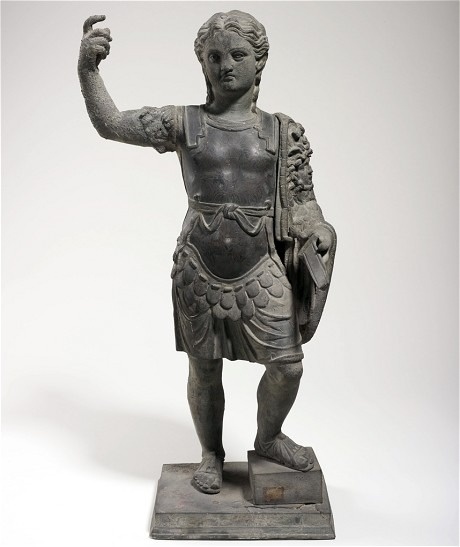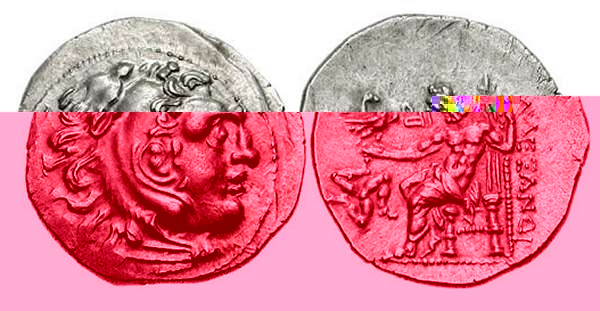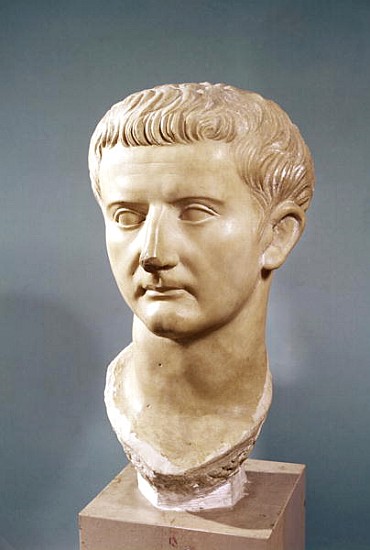Page 1 of 1
Pompeii bronze
Posted: Mon May 20, 2013 8:22 pm
by Alexias
There is an exhibition on at the British Museum with artifacts from Pompeii and Herculaneum, amongst which is this bronze of Alexander which is a comparatively recent find. It is about 18 inches high, looks nothing like him, yet appears to reference him (it isn't just me thinking it might be him as it is definitely labelled as him). His hair reaches to his shoulders and is held by a band around the back of his head. He would have originally held a spear in his right hand. There is an aegis with a Medusa on his left shoulder. I am not sure what he is holding in his left hand. I wasn't able to take a photo so found this one on the internet. The original is here
http://pinterest.com/pin/392868767463960244/.

- pompeii bronze.jpg (56.83 KiB) Viewed 8640 times
Re: Pompeii bronze
Posted: Tue May 21, 2013 10:12 am
by Xenophon
The reason that the statuette looks a trifle 'odd' is that Alexander is wearing the accoutrements of a 1st century AD Roman general/Commander. Compare it to statues of 1st century AD Emperors and you'll see. His cuirass with it's distinctive double row of semi-circular 'pteryges', the girdle tied in a 'Hercules knot' ( a square knot), and the very short sword ( 15-19 inches long) called a 'parazonium', carried under the arm ( this is the hilt in Alexander's left hand) are all typical and symbolic of a Roman Commander, also symbolic of 'virtus' ( the manly Roman virtues).... sometimes the 'parazonium' is tucked into the girdle, but usually tucked under the arm, as here.
As an alternative to a spear, he might have held a sceptre in his right hand....
Re: Pompeii bronze
Posted: Tue May 21, 2013 11:21 am
by agesilaos
Given that and by comparison with the Trajanic sculpture Alexias posted as 'An image of Alexander?' below on the board. One should really describe this as 'a statue of virtus influenced by the image of Alexander the Great' and thus not a sign of a Pompeian showing off any affinity for classical or Hellenistic Greek history, as the original text suggests, it is just the conventional portrayal of virtus of the time.
Re: Pompeii bronze
Posted: Tue May 21, 2013 11:36 am
by Alexias
Xenophon wrote:The reason that the statuette looks a trifle 'odd' is that Alexander is wearing the accoutrements of a 1st century AD Roman general/Commander. Compare it to statues of 1st century AD Emperors and you'll see. His cuirass with it's distinctive double row of semi-circular 'pteryges', the girdle tied in a 'Hercules knot' ( a square knot), and the very short sword ( 15-19 inches long) called a 'parazonium', carried under the arm ( this is the hilt in Alexander's left hand) are all typical and symbolic of a Roman Commander, also symbolic of 'virtus' ( the manly Roman virtues).... sometimes the 'parazonium' is tucked into the girdle, but usually tucked under the arm, as here.
I actually meant the facial features. The cuirass has some quite good chasing on it which doesn't show in this photo. Unfortunately I can't remember what it was other than it being decorative swirls.
Xenophon wrote:
As an alternative to a spear, he might have held a sceptre in his right hand....
I doubt it. The raised left foot would imply that some of the figure's weight is on the object he is holding, so it has got to be more than head high. I am not aware (although I could be wrong) of any tradition of Greek or Roman statues holding full-length sceptres - tridents maybe and staves with snakes entwined around it, neither of which would be appropriate for Alexander. If there are any uses of full-length sceptres, I think they would orginate from Egypt and the Levant and be based on shepherd's crooks. The European sceptre is (again I think but could be entirely wrong), medieval and based on the much shorter mace. The Romans would have had full-length legionary standards though, but I'm not sure the Greeks did.
Re: Pompeii bronze
Posted: Tue May 21, 2013 12:04 pm
by agesilaos

- Zeus with sceptre in left hand
- CNG_191734.jpg (32.67 KiB) Viewed 8608 times
As you can see the Greek sceptre is like a long stick the model is Eastern, it is based on the statue of Baal but the Hellenistic monarchs retained its form, Alexander adopted it as part of the regalia he used after Darius' defeat.
Re: Pompeii bronze
Posted: Tue May 21, 2013 1:32 pm
by Alexias
Ah, thanks. Does look more like a walking stick though, and if the sculptor couldn't get the armour right, he's unlikley to have included a detail like that. Plus, in my defence, the museum says 'spear', not 'sceptre'.
Re: Pompeii bronze
Posted: Tue May 21, 2013 4:31 pm
by amyntoros
Alexias wrote:
I actually meant the facial features. The cuirass has some quite good chasing on it which doesn't show in this photo. Unfortunately I can't remember what it was other than it being decorative swirls.
I'm with you on the facial features. It's not unusual to see Alexander portrayed in the garments of the period in which an image of him was made, but usually they try and get the facial features reasonably correct. This one, for all the world, looks like a portrait of a spoilt child about to have a temper tantrum. Made me wonder if the artist/artisan used the facial features of a then emperor as the inspiration for his Alexander. And of course "temper tantrum" made me think of both Tiberius

and Caligula

It's the mouth which bothers me the most on the statuette and although the features are not identical with those of either emperor, the rendition of the mouth looks more like theirs than it does on any Alexander head I've seen.
Best regards,
Re: Pompeii bronze
Posted: Tue May 21, 2013 7:48 pm
by agesilaos
Sorry, I was unclear,Virtus would have a spear, and thus so would this statue; I just meant to show the form of a Hellenistic sceptre, which
does look like an ornate walking stick!

Re: Pompeii bronze
Posted: Thu May 23, 2013 9:34 pm
by hiphys
What strikes me mostly is the face of this bronze: it is so uncharacteristically generic, it has no one of the features that we know distinguish a true Alexander portrait. It seems the sculptor had never seen his subject, and therefore put together a seemly (in his judgement!) head of a guy very young. This procedure remembers the one in an Apulian crater, where it is shown the defeat of Darius by Alexander: here Alexander himself is bearded as well as any Greek strategos of his age.
No wonder Alexander declared only three people were licensed to portrait himself: Lysippos, Apelles, and Pyrgoteles, and this bronze isn't Lysippean at all.
Re: Pompeii bronze
Posted: Wed Jun 05, 2013 5:17 am
by delos13
hiphys wrote:No wonder Alexander declared only three people were licensed to portrait himself: Lysippos, Apelles, and Pyrgoteles, and this bronze isn't Lysippean at all.
I am very partial to Leochares and wish his statues of Alexander survived!
Re: Pompeii bronze
Posted: Sat Aug 10, 2013 11:15 am
by marcus
I (finally) got to the Pompeii exhibition yesterday, and of course I took a good look at the statuette.
Yes, it is rather a generic face, and *extremely* young-looking. But the anastole is clear, and what isn't apparent in the photo is that he is wearing a diadem.
Just adding a couple of extra points ...

Re: Pompeii bronze
Posted: Tue Dec 03, 2013 12:29 am
by Nicator
It wouldn't be the 1st Roman bust that was a 'bust'. The face bears no resemblance to ATG at all. But it's always a pleasure to get that off beat pic to add to my bust shot collection.

